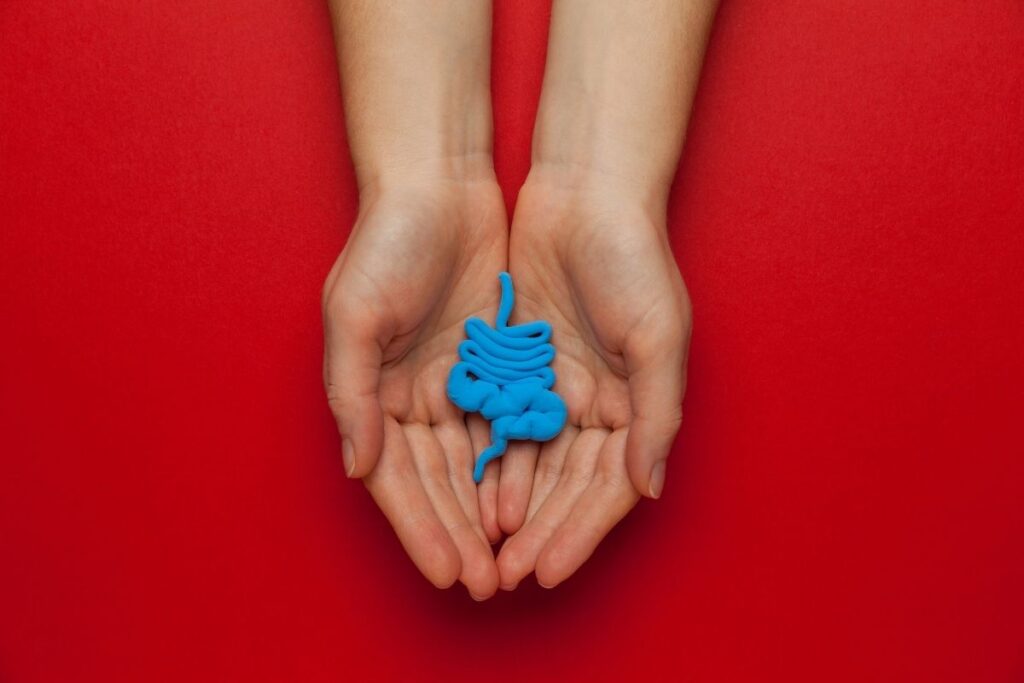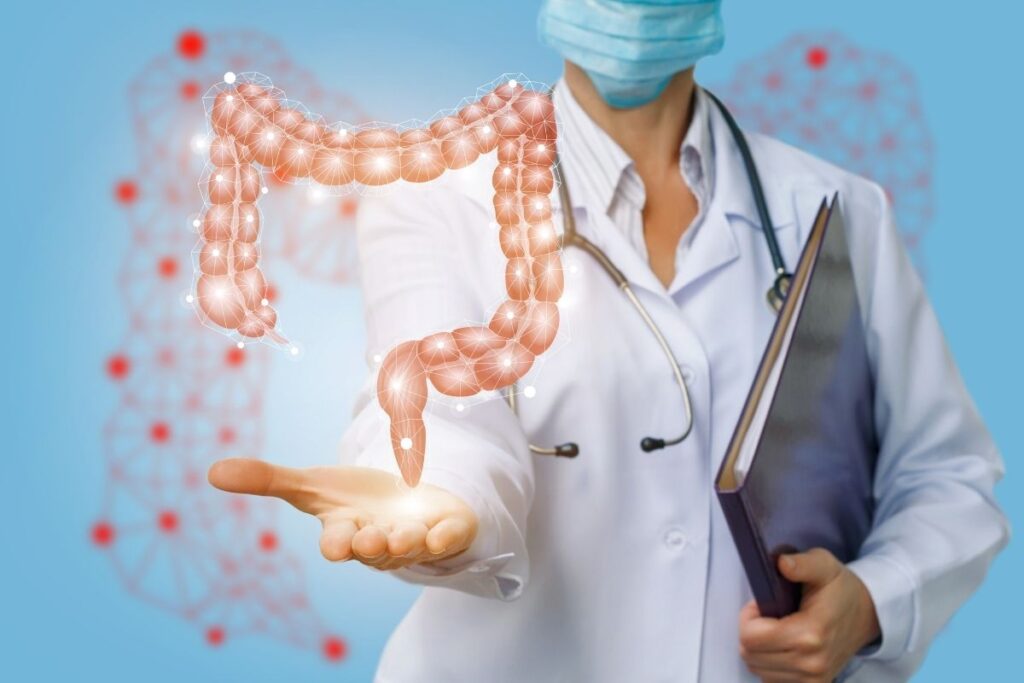
Irritable bowel syndrome and inflammatory bowel disease (IBD) are two distinct gastrointestinal disorders. Both of these disorders may have different symptoms and underlying causes, but there can often be an overlap.
While IBS is often associated with constipation, cramping, bloating, and diarrhoea, IBD involves inflammation or destruction of the bowel wall, which can result in blood in the stool, stomach cramps, fatigue and diarrhoea.
IBD have more long-term health concerns if left untreated. This means that even though there are commonalities in symptoms, accurate diagnosis is essential for appropriate treatment.
This article will explore the difference between these conditions, the symptoms and how diagnosis and treatment differ.

What is IBS (Irritable Bowel Syndrome)
Irritable bowel syndrome is a condition that affects the gastrointestinal tract and leads to gut symptoms such as abdominal pain, cramps, bloating, constipation or diarrhoea. These symptoms can range from mildly annoying to disabling, which negatively impacts a person’s quality of life on a day to day basis.
It’s common for food to trigger the symptoms of IBS, with 60% of patients reporting an increase in symptoms following a meal. [1]
People with irritable bowel syndrome (IBS) are more likely to have other functional disorders, such as fibromyalgia, chronic fatigue syndrome and chronic pelvic or temporomandibular joint disorder. These can be viewed as symptoms that appear outside of the digestive tract. While they are not symptoms of the gut, they can be related to gut health.
According to the International Foundation for Gastrointestinal Disorders:
· 10 to 15% of adults in the UK suffer from IBS symptoms.
· Women are usually more affected by the condition than men.
· IBS (Irritable Bowel Syndrome) is the gut health condition most commonly diagnosed by gastroenterologists.
· It is one of the most common chronic conditions in the UK.
· The onset of symptoms typically occur in the late teens or early adulthood, often when a person is under emotional stress. [2]
What is IBD (Inflammatory Bowel Disease)
Inflammatory bowel disease (IBD) is a chronic inflammatory disorder of the digestive system which can cause pain and discomfort. Symptoms vary depending on severity but may range from mild to severe.
Signs and symptoms that are common to both Crohn’s disease and Ulcerative colitis include:
· Diarrhoea
· Fatigue
· Abdominal pain and cramping
· Blood in your stool
· Reduced appetite
· Unintended weight loss
There are 2 types of Inflammatory bowel disease.
· Crohn’s Disease
· Ulcerative Colitis
Crohn’s disease can impact any part of the digestive tract but most commonly, it is present in the small intestine or the first part of the large intestine.
Ulcerative Colitis is the most common type of inflammatory bowel disease. This causes lessons and ulcers to form in the bowel, specifically in the large intestine.
Similar Symptoms of IBS and IBD
The symptoms of IBS and IBD can be similar and overlap in several areas. These similar symptoms can include:
· Stomach pain
· Diarrhoea
· Urgency to go to the toilet
· Bloating
· Incomplete bowel movement
In some cases of IBD, constipation can be a common symptom.
Both of these symptoms can be considered long-lasting and impact individuals of any age. However, in both, symptoms tend to appear in younger life. (eg, before the age of 40).

Different Symptoms of IBS and IBD
To consider the differences between these conditions, we can review the specific symptoms of IBS and IBD.
IBS Specific Symptoms
Depending on the individual, IBS symptoms can be present on a day-to-day basis or flare up periodically.
These symptoms of IBS can include:
· Bloating
· Abdominal pain
· Food reactions
· Constipation or diarrhoea
IBD Specific Symptoms
The symptoms of IBS (listed above) can also be present in cases of IBD. However, there are specific differences.
· Blood in the stool
· More frequent bowel movements
In IBD, it’s also possible for there to be further symptoms in other areas of the body.
These include:
· Arthritis
· Skin conditions (e.g., psoriasis)
· Eye conditions/inflammation
· Liver conditions

Causes of IBS and IBD
As with symptoms of these conditions, there is a crossover with the causes of IBS and IBD.
IBS Causes
There is a wide range of causes and risk factors for developing IBS. These are not present in each IBS patient, but each increases the risk of developing this condition.
· Infections
· Food intolerances or sensitivities
· Low fibre diet
· Low-grade inflammation
· Stress
· Genetics
· SIBO
IBD Causes
Similar factors are considered causes and risks for developing inflammatory bowel disease. It is understood that the individual’s genetics plays a central role in whether inflammatory bowel disease is triggered.
These causes and risks of IBD include:
· Genetics
· Early life factors
· Stress
· Eating a highly processed diet
· The gut microbiome
This can be understood as the change in the immune response within the gut, which then leads to an inflammatory response. This irritation and ‘weakening’ of the gut can take place over a period of time due to factors that include long-term dietary patterns, stress and environmental pollutants. These factors, combined with genetics, may then lead to the onset of IBD. [3]
Diagnosing IBS and IBD
When considering the diagnostic process for IBS and IBD, there are several factors to consider.
IBS Diagnosis: The diagnostic process of IBS involves both symptom assessments as well as further tests.
A specific set of symptoms is required for a diagnosis of IBS. These are outlined in the ROME IV criteria, which state that symptoms such as bloating, abdominal pain and changes in bowel patterns are the main 3 symptoms of IBS.
Importantly, other causes of symptoms should be ruled out via testing. This means that other conditions such as coeliac disease, H. pylori and inflammatory bowel diseases all need to be excluded before a diagnosis of IBS can be made.
IBD Diagnosis: The diagnostic process for IBD starts in a similar way to that of IBS. This is based on symptoms and initial tests assessing for inflammation, which include:
· Calprotectin (stool test)
· Hs-CRP (blood test)
Further tests may then be carried out to examine the gut in more detail.
These include imaging tests such as:
· MRI
· CT-scans
· X-ray
· CT enterography
· MR enterography
And scopes:
· Colonoscopies
· Upper endoscopies
· Sigmoidoscopies
· Capsule endoscopies
Treatment Options
The diagnosis of IBS or IBD can help to provide a clearer treatment pathway and better health outcomes.
For both, the 3 main factors of treatment include:
· Diet
· Lifestyle · Supplements [4]
IBS Treatment:
From a dietary perspective, strategies such as a low FODMAP diet can be a strategy to help reduce IBS symptoms. While this diet is not treating the underlying issue, it can provide more clarity around specific triggers and improve quality of life. However, the long-term aim is to address underlying issues and for the diet to be unrestricted.
Lifestyle factors such as meal timing and stress management can be important components of a comprehensive IBS treatment strategy. Well-studied approaches such as gut-directed hypnotherapy can also be introduced as a form of gut-brain support.
In addition to these, certain supplements have also been found to help address IBS symptoms.
These include:
· Probiotics
· Prebiotics
· Peppermint oil
· Colostrum
· Herbal antimicrobials
· Digestive enzymes
· Simethicone
IBD Treatment
Due to the partial cross-over in causes of IBS and IBD, there are similarities as well as differences between treatments.
From a dietary perceptive, removing ultra-processed foods can be a first step in dietary support. Alongside this, increasing the amount of natural fruit, vegetables, as well as pulses. Depending on the severity and stage of the disease, some of these may need to be reduced to manage symptoms. This may lead to diets such as SCD (specific carbohydrate diet) or the IBD-AID (Inflammatory bowel disease Anti-inflammatory diet).
Certain supplements have also be used in IBD treatments with benefits reported from clinical trials.
These include:
· Vitamin D
· Probiotics (L Rhamnosus GG, VSL3)
· Prebiotics
· Anti-inflammatories (Curcumin, fish oils)
· Sodium butyrate · Colostrum [4]
Stress is also a known trigger for IBD as it can be directly inflammatory. Stress management practices such as meditation and mindfulness can be important treatment strategies.
Complications of IBS and IBD
Both bowel conditions can lead to a varied degree of disruption as well as complications.
IBS Complications: The complications of IBS primarily affect quality of life, leading to anxiety and depression.
This is where unpredictability of bowel health, proximity to a toilet, as well as the uncertainty around food reactions can directly influence mood and mental health. This can be further related to the change in symptoms and how this influences social activities, possibly leading to more isolation and less contact with family and friends.
It’s also possible for the changes seen in the gut (gut bacteria imbalances and low-grade inflammation) of those IBS to lead to alterations in mental health and well being.
This can include symptoms and complications such as:
· Anxiety
· Depression
IBD Complications
The complications of IBD can be more severe than IBS.
These complications include:
· Dehydration
· Malnutrition (due to malabsorption)
· Anaemia (due to malabsorption)
· Infections (especially if taking immune-suppressing medications)
· Bowel obstructions (due to inflammation or scarring)
· Increased risk of colon cancer
· Removal of part of the bowel
Conclusion
IBS and IBD may sound similar and impact the same part of the body, but the underlying causes, treatments and complications vary.
This means that appropriate and accurate diagnosis can be an essential first step in the treatment process. This can improve short-term as well as long-term outcomes.
Working with a registered gut health practitioner can be a central part of this treatment
History
Updated by Martin Cohen, 27th January 2025
Section
- Cuomo R, Andreozzi P, Zito FP, Passananti V, De Carlo G, Sarnelli G. Irritable bowel syndrome and food interaction. World J Gastroenterol. 2014 Jul 21;20(27):8837-45. doi: 10.3748/wjg.v20.i27.8837. PMID: 25083057; PMCID: PMC4112903.
- Enck P, Aziz Q, Barbara G, Farmer AD, Fukudo S, Mayer EA, Niesler B, Quigley EM, Rajilić-Stojanović M, Schemann M, Schwille-Kiuntke J, Simren M, Zipfel S, Spiller RC. Irritable bowel syndrome. Nat Rev Dis Primers. 2016 Mar 24;2:16014. doi: 10.1038/nrdp.2016.14. PMID: 27159638; PMCID: PMC5001845.
- McDowell C, Farooq U, Haseeb M. Inflammatory Bowel Disease. 2023 Aug 4. In: StatPearls [Internet]. Treasure Island (FL): StatPearls Publishing; 2025 Jan–. PMID: 29262182.
- https://www.crohnscolitisfoundation.org/patientsandcaregivers/what-is-ibd
- Patel NV. “Let Food Be Thy Medicine”: Diet and Supplements in Irritable Bowel Syndrome. Clin Exp Gastroenterol. 2021 Sep 22;14:377-384. doi: 10.2147/CEG.S321054. PMID: 34588791; PMCID: PMC8473929.






